|
|
|
Sort Order |
|
|
|
Items / Page
|
|
|
|
|
|
|
| Srl | Item |
| 1 |
ID:
092628
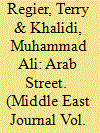

|
|
|
|
|
| Publication |
2009.
|
| Summary/Abstract |
Understanding Arab public opinion is central to the search for sustainable political solutions in the Middle East. The way Westerners think about Arab public opinion may be affected by how it is referred to in their news media. Here, we show that Arab public opinion is rarely referred to as such in the US media. Instead, it is usually referred to as the Arab street, a metaphor that casts Arab public opinion as irrational and volatile. We trace the origins of this metaphor to similar expressions in both English and Arabic, and note similarities and important differences between the English and Arabic usages. Ultimately, we argue that the Arab street metaphor misrepresents the Arab public, and invites dismissal of rather than engagement with Arab public opinion.
|
|
|
|
|
|
|
|
|
|
|
|
|
|
|
|
| 2 |
ID:
168986
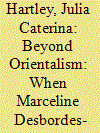

|
|
|
|
|
| Summary/Abstract |
This article follows a thread of translation and intertextual dialogue, taking us from the thirteenth-century Persian poet Saʿdi to the nineteenth-century French poet Marceline Desbordes-Valmore. It reads Desbordes-Valmore’s poem ‘Les roses de Saadi’ (1860) with the two passages from Saʿdi’s Golestān from which it was inspired, shedding new light on the poem’s metapoetic subtext. The original Persian text is compared to two French translations that were circulating at the time when Desbordes-Valmore was writing. This analysis of the Golestān’s reception forms the basis for the argument that Desbordes-Valmore recast in secular terms Saʿdi’s discourse on poetic language, emphasizing the continuity, rather than difference, between her concerns and Saʿdi’s. The case of Desbordes-Valmore thus reveals a forgotten facet of nineteenth-century French engagements with Middle Eastern culture: one of identification and literary influence, which existed alongside the processes of “othering” for which the period is better known.
|
|
|
|
|
|
|
|
|
|
|
|
|
|
|
|
| 3 |
ID:
146647


|
|
|
|
|
| Summary/Abstract |
Through the selective allocation of attention, framing and metaphors in covering foreign affairs and countries, media narratives often act to delegitimise, marginalise and demonise international actors. Focusing on Australian reportage of North Korea in The Australian, The Sydney Morning Herald and from the Australian Broadcasting Corporation (ABC) between 1 January 2010 and 31 December 2012, this paper explicates how the framing mechanisms utilised in media point to media complicity in reinforcing a negative, adversarial orientation towards North Korea. It also discusses implications for how Australians view the North Korean people, Australian–North Korean relations, and policy pertaining to Northeast Asia more broadly.
|
|
|
|
|
|
|
|
|
|
|
|
|
|
|
|
| 4 |
ID:
183032


|
|
|
|
|
| Summary/Abstract |
This article considers how mainstream newspapers metaphorically represented the British “jihadi brides”, women and girls who travelled to Syria to live in the self-declared “Islamic State” (I.S.). Based on an analysis of 365 articles published between 2013 and 2018, the article demonstrates that three frequently occurring metaphors contributed to the construction of these women and I.S. in general, representing them as natural, biological and supernatural forces. These metaphors served to convert a new phenomenon into a knowable form, but in doing so evoked homogenizing and dehumanizing representations that structured the scope of possibilities for responding to the problem of the “brides”. Ultimately, these social constructions had material consequences, as demonstrated by the mood of indifference among policy-makers to the fate of British I.S. fighters and their families following the fall of the “caliphate”.
|
|
|
|
|
|
|
|
|
|
|
|
|
|
|
|
| 5 |
ID:
101843
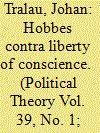

|
|
|
|
|
| Publication |
2011.
|
| Summary/Abstract |
It has often been argued that, notwithstanding his commitment to the authoritarian state, Thomas Hobbes is a champion of the "minimal" version of liberty of conscience: namely, the freedom of citizens to think whatever they like as long as they obey the law. Such an interpretation renders Hobbes's philosophy more palatable to contemporary society. Yet the claim is incorrect. Alongside his notion of "private" conscience, namely, Hobbes develops a conception of conscience as a public phenomenon. In the following, it is argued that this inconsistency serves the purpose of deception: it holds out the possibility of dissent while making it impossible to utilise. Arguably, moreover, this is the proper hermeneutical approach to take to Hobbes's inconsistencies in general. Indeed, said inconsistencies ought to alert contemporary normative theorists to the instability of the "minimal" version of liberty of conscience attributed to Hobbes: Hobbes himself, namely, shows that it is insufficient.
|
|
|
|
|
|
|
|
|
|
|
|
|
|
|
|
| 6 |
ID:
085434


|
|
|
|
|
| Publication |
2008.
|
| Summary/Abstract |
Terrorism studies is fascinated with the terrorist actor. Though this may seem natural, the present article argues that a different perspective can be fruitful. From a constructivist point of view, terrorism is a social construction. The terrorist actor is a product of discourse, and hence discourse is the logical starting point for terrorism research. In particular, it is the discourse of the terrorists' adversaries that constitutes terrorist motivations, strategies, organizational structures and goals. Hence, the article suggests a shift of perspective in terrorism studies - from an actor-centred to a discourse-centred perspective.
|
|
|
|
|
|
|
|
|
|
|
|
|
|
|
|
| 7 |
ID:
106634


|
|
|
| 8 |
ID:
096064
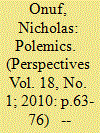

|
|
|
| 9 |
ID:
059380
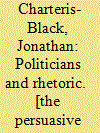

|
|
|
|
|
| Publication |
Hampshire, Palgrave Macmillan, 2005.
|
| Description |
xii, 239p.Hbk
|
| Standard Number |
1403946892
|
|
|
|
|
|
|
|
|
|
|
|
Copies: C:1/I:0,R:0,Q:0
Circulation
| Accession# | Call# | Current Location | Status | Policy | Location |
| 049238 | 825.910915/CHA 049238 | Main | On Shelf | General | |
|
|
|
|
| 10 |
ID:
092090
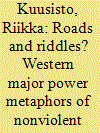

|
|
|
|
|
| Publication |
2009.
|
| Summary/Abstract |
Our conceptual systems are metaphorical in nature: We understand complex issues by comparing them with relatively straight-forward and familiar ones. Renowned experts of nonviolent problem solving, such as Mahatma Gandhi, Albert Luthuli, and Martin Luther King, Jr., have structured difficult conflicts in terms of roads, gardens, building projects, and riddles. The conflict rhetoric of leaders of the major Western powers-the United States, Britain, and France-is most often studied in violent contexts, vis-à-vis epic battles and tragic catastrophes. However, when dealing with mundane disputes among fundamentally like-minded parties, disagreements with petty challengers and debates with major powers with different political systems, for example, US, British, and French leaders employ many of the metaphors that nonviolence activists do. Understanding and expanding this sphere of comic conflict resolution-where ingenuity and reflection instead of black-and-white juxtaposition are the norm-is essential in the search for a more peaceful, yet vibrant world.
|
|
|
|
|
|
|
|
|
|
|
|
|
|
|
|
| 11 |
ID:
144578


|
|
|
|
|
| Summary/Abstract |
The Romans understood that translation entails transformation. The Roman term “translatio” stood not only literally for a carrying-across (as by boat) of material from one country to another, but also (metaphorically) for both linguistic translation and metaphorical transformation. These shared usages provide a lens on Roman anxieties about their relationship to Greece, from which they both transferred and translated a literature to call their own. Despite the problematic association of the Greeks with pleasure, rhetoric, and poetic language, the Roman elite argued for the possibility of translation and transformation of Greek texts into a distinctly Roman and authoritative mode of expression. Cicero's hope was that eventually translated Latin texts would replace the Greek originals altogether. In the end, however, the Romans seem to have felt that effeminacy had the last laugh.
|
|
|
|
|
|
|
|
|
|
|
|
|
|
|
|
| 12 |
ID:
100164


|
|
|
| 13 |
ID:
168958
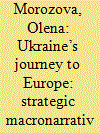

|
|
|
|
|
| Summary/Abstract |
Informed by strategic narrative theorisation and cognitive metaphor theory refined and expanded, this paper analyses textual and pictorial instantiations of cognitive metaphors used to describe and explain the trajectory of Ukraine’s development and form a particular narrative of this movement. Both narrative and cognitive metaphor are considered as tools for navigating experience and serving to construe its subjective images. The study focuses on the ways these tools were used by Ukrainian print media (eight influential outlets) in 2016. The outcomes demonstrate how a coherent strategic macronarrative of Ukraine’s course of development emerges from metaphoric images that survive semiotic mode changes, alternating between textual and pictorial. The macronarrative is that of Ukraine on a hero’s journey towards the European Union – a journey with political and economic implications for both Ukraine and the EU.
|
|
|
|
|
|
|
|
|
|
|
|
|
|
|
|
| 14 |
ID:
177782
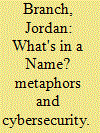

|
|
|
|
|
| Summary/Abstract |
For more than a decade, the United States military has conceptualized and discussed the Internet and related systems as “cyberspace,” understood as a “domain” of conflict like land, sea, air, and outer space. How and why did this concept become entrenched in US doctrine? What are its effects? Focusing on the emergence and consolidation of this terminology, I make three arguments about the role of language in cybersecurity policy. First, I propose a new, politically consequential category of metaphor: foundational metaphors, implied by using particular labels rather than stated outright. These metaphors support specific ways to understand complex issues, provide discursive resources to some arguments over others, and shape policy contestation and outcomes. Second, I present a detailed empirical study of US military strategy and doctrine that traces the emergence and consolidation of terminology built on the “cyberspace domain.” This concept supported implicit metaphorical correspondences between the Internet and physical space, yielding specific analogies and arguments for understanding the Internet and its effects. Third, I focus on the rhetorical effects of this terminology to reveal two important institutional consequences: this language has been essential to expanding the military's role in cybersecurity, and specific interests within the Department of Defense have used this framework to support the creation of US Cyber Command. These linguistic effects in the United States also have implications for how other states approach cybersecurity, for how international law is applied to cyber operations, and for how International Relations understands language and technological change.
|
|
|
|
|
|
|
|
|
|
|
|
|
|
|
|
|
|
|
|
|